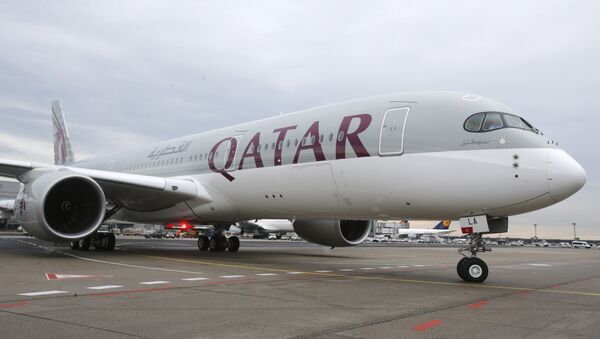In a major safety slip-up, a water tanker hit a Qatar Airways aircraft that was preparing to take off for Doha at an airport in Kolkata in eastern India.
The plane was stationed at the airport and around 100 passengers were boarding when the incident took place. Initial inspection suggests that the water tanker had technical issues; the brake was not functioning properly.
READ MORE: Flight With 136 Persons Hits Wall Before Take-Off in India (PHOTO)
"Around 2.30 am (Indian Standard Time) when passengers were boarding the plane, a water tanker hit the belly of the Doha-bound flight, near the landing gear," Airports Authority of India (AAI) released a statement.
Qatar Airways Doha- Kolkata flight hit a water tanker during arrival at Kolkata's Netaji Subhas Chandra Bose International Airport at 01:52 am last night. All passengers safe. The aircraft's belly was damaged. The aircraft has been taken away for repairs: Airport official
— ANI (@ANI) November 1, 2018
"All 103 passengers of the flight have been provided accommodation at a nearby hotel. They will be taking the 3 am flight to Doha tomorrow (Friday)," the AAI said.
Despite making persistent claims about its focus on passenger safety, the Indian civil aviation sector has more or less failed to minimize the number of incidents that put several lives at stake.
On October 12, an Air India flight with 136 persons on board hit a compound wall in Trichy before takeoff. Surprisingly, the pilot was unaware of the damage caused to the plane and it was the airport officials who told the pilot in command about the damage.
READ MORE: Indian Airliner Has Passenger Removed for Trying to Charge Phone Inside Cockpit
On October 8, the engine of an IndiGo A320 neo aircraft failed mid-air, forcing the plane to return to Bangalore airport. IndiGo has been facing problems with Pratt & Whitney engines powering its A320 neo aircraft.
On September 19, the Jet Airways crew forgot to turn on the so-called "bleed switch," resulting in a drop in cabin pressure that caused headaches and caused passengers to bleed from their noses and ears.



